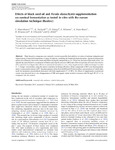
Please use this identifier to cite or link to this item:
http://ricaxcan.uaz.edu.mx/jspui/handle/20.500.11845/883| Title: | Effects of black seed oil and Ferula elaeochytris supplementation on ruminal fermentation as tested in vitro with the rumen simulation technique (Rusitec) |
| Authors: | Klevenhusen, Fenja Decardt, Kathrin Sizmaz, Ö Wimmer, S Muro Reyes, Alberto Khiaosa-Ard, R Chizzola, R Zebeli, Quendrim |
| Issue Date: | 20-May-2015 |
| Publisher: | CSIRO PUBLISHING |
| Abstract: | Plant bioactive compounds are currently viewed as possible feed additives in terms of methane mitigation and improvement of ruminal fermentation. A range of analyses, including the botanical characterisation, chemical composition and in vitro efficiency, haveto be conducted before testing the compoundsin vivo. Therefore, the aims of this study were (1) to identify the main bioactive components of black seed (Nigella sativa) oil (BO) and of the root powder of Ferula elaeochytris (FE), and (2) to investigate their effects on ruminal fermentation in vitro, when supplemented in different dosages to a diet (1 : 1, forage : concentrate), using the rumen simulation technique (Rusitec). Main compounds of BO were thymoquinone and p-cymene and a-pinene in FE. Supplementation of the diet with BO and FE did not affect concentration of volatile fatty acids but ammonia concentrations decreased with both supplements (P < 0.001). No effects of supplements on protozoal counts were detected but in vitro disappearance of DM and organic matter tended to increase with 50 mg/L FE (P < 0.1), compared with the control. |
| Description: | Plant bioactive compounds are currently viewed as possible feed additives in terms of methane mitigation and improvement of ruminal fermentation. A range of analyses, including the botanical characterisation, chemical composition and in vitro efficiency, haveto be conducted before testing the compoundsin vivo. Therefore, the aims of this study were (1) to identify the main bioactive components of black seed (Nigella sativa) oil (BO) and of the root powder of Ferula elaeochytris (FE), and (2) to investigate their effects on ruminal fermentation in vitro, when supplemented in different dosages to a diet (1 : 1, forage : concentrate), using the rumen simulation technique (Rusitec). Main compounds of BO were thymoquinone and p-cymene and a-pinene in FE. Supplementation of the diet with BO and FE did not affect concentration of volatile fatty acids but ammonia concentrations decreased with both supplements (P < 0.001). No effects of supplements on protozoal counts were detected but in vitro disappearance of DM and organic matter tended to increase with 50 mg/L FE (P < 0.1), compared with the control. |
| URI: | http://localhost/xmlui/handle/20.500.11845/883 https://doi.org/10.48779/1x9b-jp81 |
| ISSN: | 1836-0939 |
| Other Identifiers: | info:eu-repo/semantics/publishedVersion |
| Appears in Collections: | *Documentos Académicos*-- UA Veterinaría |
Files in This Item:
| File | Description | Size | Format | |
|---|---|---|---|---|
| 8.- 2015 Klevenhusen et al., 2015.pdf | 162,43 kB | Adobe PDF |  View/Open |
This item is licensed under a Creative Commons License
